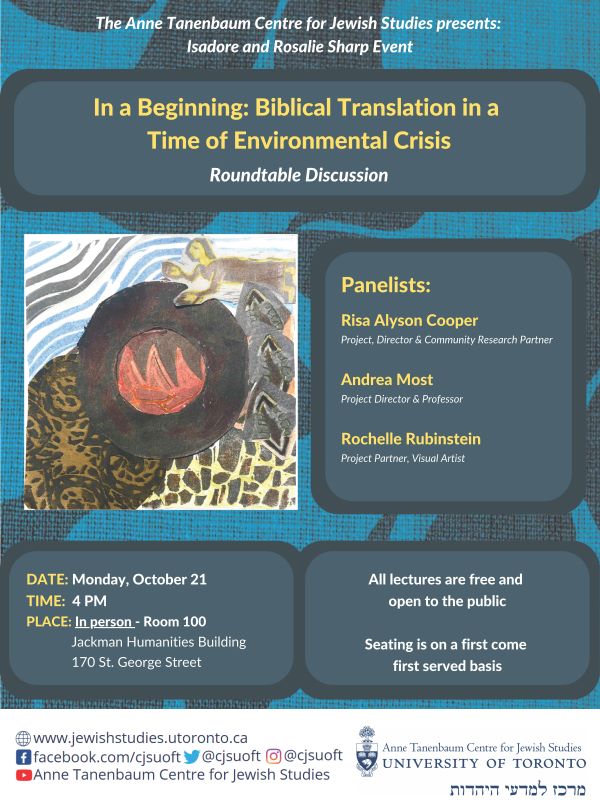In a Beginning: Biblical Translation in a Time of Environmental Crisis
When and Where
Speakers
Description
A roundtable discussion with Project Directors, Andrea Most and Risa Alyson Cooper and Visual Artist, Rochelle Rubinstein.
Description: What do the creation stories of Genesis reveal about our relationship to the natural world? How have centuries of assumptions, interpretations, and translations of these stories shaped how we live on this earth? What stories - and ways of life - might emerge if we read this ancient text hrough the lens of environmental crisis and with the tools of the environmental humanities?
Traditional understandings of Genesis, and especially the major English translations, offer a story of a singular omniscient deity, acting upon the passive elements of creation in order to form the world we know today. It is this version of the story that we have inherited, learned, and taught; a story which views the living earth as resources to be dominated or stewarded by human beings who are separate from the rest of the natural world. As we bear witness to devastating environmental degradation, we intuit that this version of our foundational cultural myth is part of the problem. And so we have stepped away from centuries of traditions and assumptions, striving instead to hear within and between the words of Genesis 1 a different story, one rooted in the oral traditions of our land-based ancestors. What is emerging is a non-linear ecocritical translation, in which the elements of creation are active subjects, collaborating in the conception of a world that is animate and alive.
Panelists:
Andrea Most is Professor of American Literature, Environmental Studies, and Jewish Studies in the Department of English at the University of Toronto and is affiliated with the Centre for Jewish Studies, the School of the Environment, the Department for the Study of Religion, the Centre for the Study of the United States and the Centre for Drama, Theatre and Performance Studies. Committed to breaking down divisions between scholarship and public life, research and teaching, mind and body, nature and culture, Prof. Most teaches experiential courses on food and environmental literature, conducts multidisciplinary community-engaged research, and speaks widely on the local food and environmental movements. Prof. Most was recognized for her groundbreaking teaching with the Northrop Frye Award (2016) and for her community work with the 2022 Ludwig and Estelle Jus Human Rights Influential Leader Prize.
Risa Alyson Cooper has been working in the field of Jewish environmentalism for over 20 years. For 13 years, she served as the Founding Executive Director of Shoresh Jewish Environmental Programs, a regional non-profit committed to nature-based Jewish education and environmental action. As part of her role at Shoresh, Risa was a founding member of Bela Farm, a rural lab for regenerative agriculture and land-based learning and activism. In partnership with Andrea Most and Rochelle Rubinstein, Risa has developed and managed multiple land-based programs, festivals, rituals, and community actions over the years. Risa has a B.A. Honours from Queens University in Religious Studies and an M.A. from University of Toronto’s Centre for the Study of Religion in Jewish Environmental Ethics. In 2013, she was awarded the Pomegranate Prize by the Covenant Foundation for exceptionalism in Jewish education. Risa now works at Adamah, the largest Jewish environmental organization in North America, as their Chief National Programs Officer.
Rochelle Rubinstein is a Toronto-based printmaker, painter, fabric and book artist. Her work has been exhibited internationally and can be found in public collections such as the Museum of Modern Art, New York; the Irish Museum of Modern Art, Dublin; and the Victoria and Albert Museum, London. Rochelle curates exhibitions at Mon Ton Window Gallery in Kensington Market, Toronto. She has completed artist residencies in Ireland, the US and Canada. As a community arts facilitator, her workshops and projects involving health workers, abused women, people with eating disorders, seniors with depression, Palestinian and Jewish artists, youth at risk, and environmentalists, are based on methods that are central to her own art practice: drawing, carving, printing, sewing, and bookmaking. Rochelle is also steward of Bela Farm, in Hillsburgh, Ontario, where she is engaged in agriculture, art, and activism.
After the event on Monday afternoon, there will be viewings of the art exhibit in the ATCJS space. There will be 2 tours, and audience members who would love to join may sign up at the lecture.



